Understanding Macaw Parrots: Care and Insights
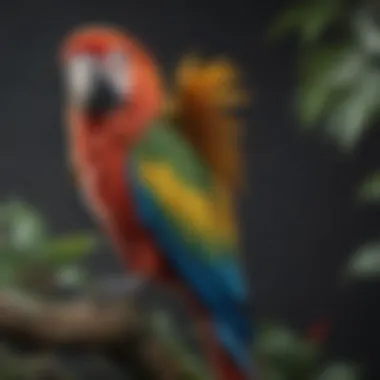
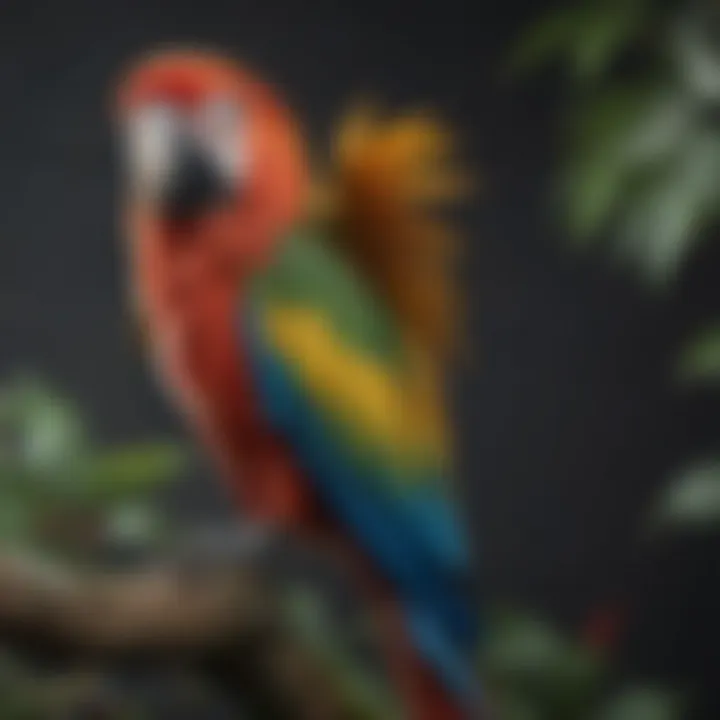
Intro
Macaw parrots are not just birds; they are vibrant beings full of personality, charm, and intelligence. These striking creatures, with their vivid colors and engaging behaviors, have captured the hearts of many animal lovers and potential pet owners alike. However, welcoming a macaw into your home is not just a matter of providing a few toys and food; it involves a commitment to understanding their unique needs and characteristics. In this article, we’ll explore the complexities of macaws, guiding prospective and current owners through their behaviors, environments, and essential care requirements.
By diving deep into the world of macaw parrots, we aim to foster a deeper appreciation for these magnificent birds. Whether you’re considering adopting a macaw or you’re already a proud owner, knowledge about their social structures, dietary needs, and emotional connections with humans will enhance your caregiving experience and, ultimately, the well-being of your feathered friend.
Prologue to Macaw Parrots
Understanding the world of Macaw parrots is vital for anyone interested in these captivating birds. Macaws are not only visually stunning, with their vibrant feathers and large sizes, but they also possess complex behaviors and emotional needs that require attention. For current or aspiring pet bird owners, grasping the nuances of Macaw care can significantly enhance the relationship between birds and their humans.
Getting to know Macaws involves exploring their taxonomy and history. Knowing their classification helps in understanding their natural instincts and behaviors. Additionally, a glimpse into their domestication history provides insights into how these magnificent creatures have evolved alongside humans.
By delving into this introduction, one can appreciate the depth of knowledge needed for responsible Macaw ownership. It's more than simply providing food and shelter; it involves nurturing a bond that respects their needs as intelligent, social beings. The importance of this understanding is paramount in ensuring the well-being and longevity of these enchanting companions.
Taxonomy and Classification
Macaws belong to the family Psittacidae, under the order Psittaciformes. This group comprises a varied array of parrots, but Macaws stand out for their size and striking colors. Within the Macaw genus, Ara is primarily recognized, which includes familiar species like the Blue-and-Gold Macaw and the Scarlet Macaw.
The classification of Macaws can be broken down as follows:
- Family: Psittacidae
- Subfamily: Arinae
- Genus: Ara
Each species carries unique traits that cater to their adaptability in the wild. For instance, the Green-Winged Macaw is known to have a gentle temperament, while the Blue-throated Macaw is often more reserved. Understanding these differences is crucial for discerning pet owners who want to cater to a Macaw's specific needs and behaviors.
History and Domestication
Macaws have a rich history, dating back to ancient civilizations in South America. They were treasured by various indigenous cultures, often seen as symbols of wealth and beauty. Their vibrant feathers adorned ceremonial attire and their presence in folklore adds layers to their charm.
Historically, Macaws were captured and traded, but this often led to population declines due to unsustainable practices. However, as awareness about wildlife preservation grew, efforts to domesticate Macaws were seen through responsible breeding programs. Today, many Macaws in households are bred by reputable breeders who follow ethical practices.
Understanding their domestication journey helps pet owners appreciate the uniqueness of their Macaws. These birds thrive in environments where they are treated with respect and care, reflecting their past interactions with people. Whether it's through gentle handling or mental stimulation, fostering a positive living environment is reminiscent of the nurturing relationships they once had with humans.
Natural Habitat of Macaws
The natural habitat of macaws is not just a backdrop for their existence; it is intricately tied to their behavior, social structure, and overall well-being. Understanding where these vibrant birds come from is essential for anyone looking to provide appropriate care and mimic their natural experiences in captivity. Macaws thrive in diverse environments, which ultimately influence their diet, social interactions, and health.
Geographical Distribution
Macaws are native to the tropical forests of Central and South America, with each species exhibiting a unique geographical range. For instance, the vibrant Scarlet Macaw can be found in rainforests of countries like Peru, Honduras, and Ecuador, while the Blue-and-yellow Macaw enjoys habitats that stretch across Brazil, Argentina, and Paraguay.
These areas are characterized by lush trees and abundant vegetation, providing essential cover from predators and a rich source of food. It's fascinating to note that while wild macaws primarily inhabit lowland rainforests, you can also spot them in savannahs and even semi-arid regions. Diverse habitats indicate the adaptability of these birds - showcasing their ability to thrive in various conditions, so long as there are adequate food resources and nesting sites available.
One must also appreciate that localized threats, such as deforestation and climate change, significantly impact these birds’ natural ranges, leading to a decline in both population numbers and biodiversity. In many instances, macaws have been seen traveling to nearby protected areas or human-influenced landscapes in search of food. Such movements can inform bird owners about the importance of patience and observation between individual birds and their environments.
Ecosystems and Environment
Macaws exist in a wide range of ecosystems that ultimately shapes their dietary habits and interactions within their environment. Tropical rainforests, seasonal forests, and even gallery forests alongside rivers showcase the adaptability of these species. The vegetation within these ecosystems also offers vital elements for nesting, feeding, and social behaviors.
In the wild, macaws predominantly feed on seeds, nuts, fruits, and berries, favoring plants such as palm trees and fig trees that offer not only food but also nesting sites. The availability of these food sources influences macaw breeding patterns, as the birds typically nest in areas abundant with their preferred diets, ensuring the survival of their young.
Moreover, the ecosystems where macaws reside play host to a complex web of interactions between various species. Macaws serve as important seed dispersers, helping maintain the balance within their habitats. Their unique beaks have evolved to crack open hard-shelled nuts, directly contributing to forest regeneration by allowing new plants to flourish.
Understanding these ecological dynamics is crucial for pet owners and breeders looking for ways to mimic natural diets and environments. From creating a suitable aviary filled with various plants to ensuring balanced nutrition, angling toward their wild ecosystem can lead to happier and healthier macaws in captivity.
"For macaws, their natural habitat isn’t just home—it’s the backbone of their conservation in our care."
Learning about the natural habitat of macaws equips bird enthusiasts with valuable insights into creating environments that cater to these extraordinary birds' innate needs. By looking at their wild counterparts, we not only enhance our understanding but also nurture the sense of connection that is vital in macaw care.
Physical Characteristics
Understanding the physical characteristics of macaw parrots is crucial for a nod of appreciation and respect for their natural splendor. This section dives into the intricacies of their size and weight, color varieties and patterns, and lifespan and longevity. These traits are not merely for aesthetic pleasure; they hold significant implications for their care and well-being in captivity and the wild.
Size and Weight
Macaws boast impressive size and weight, often captivating anyone who lays eyes upon them. These birds typically range from 12 to 40 inches in length, depending on the species. The larger macaws like the Hyacinth Macaw can weigh anywhere from 2 to 4 pounds, while the smaller ones like the Blue-headed Macaw might clock in at around 1.5 pounds.
The size of a macaw directly correlates with its need for space and stimulation. A larger macaw needs a roomy cage that allows for movement, stretching, and a place to perch safely. When considering a macaw as a pet, it’s prudent to factor in how much space you have. Not just inside the cage, but also in your home. These birds are active and curious; they thrive on exploration, which means they’ll need a safe area to flap their wings and engage the environment.
Color Varieties and Patterns
Color is where macaws truly shine, dazzling bird enthusiasts and casual observers alike. Their feathers present a stunning spectrum that goes beyond simple aesthetics. Each species of macaw exhibits distinct color varieties and patterns. For example, the Scarlet Macaw flaunts rich red feathers with splashes of yellow and blue, while the Green-winged Macaw dazzles with vibrant green and red hues.
These unique colors not only enhance the visual appeal but serve various purposes from a biological perspective. Bright colors can often indicate a bird’s health status or readiness to mate. Moreover, color patterns aid in recognition and communication. For a pet owner, understanding these color traits can foster deeper connections with their birds.
"The hues of a macaw can tell many tales; it’s like nature’s own canvas, splashed with emotion and personality."
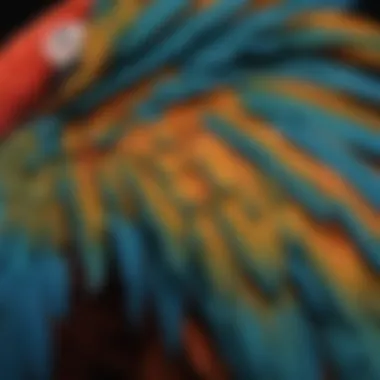
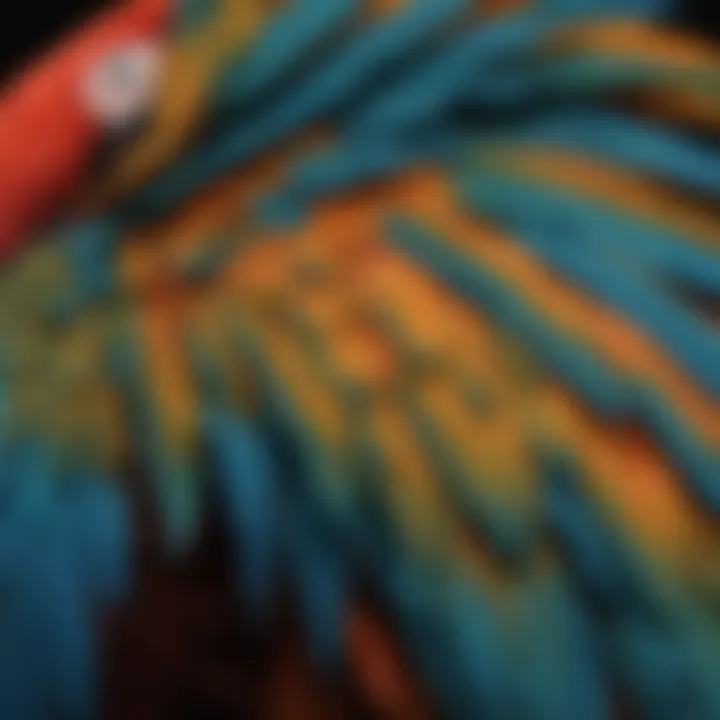
Lifespan and Longevity
Lifespan is another critical aspect when it comes to macaws. On average, wild macaws can live for about 30 to 50 years, with some reports of individuals reaching 80 years in captivity. The factors affecting lifespan and longevity range from genetic predispositions to environmental influences and dietary habits.
Intelligently managed care can significantly extend a macaw’s life. Owners need to prioritize nutritional balance, provide regular veterinary check-ups, and foster a stimulating environment that challenges their minds and bodies. Consider making room in your heart and home for such a long-term commitment; it’s not just about keeping a pet; it’s about sharing your life with a remarkable being that can be a companion for decades.
In summary, delving into the physical attributes of macaws not only prepares potential owners for the journey ahead but brings a deeper understanding of these magnificent creatures. Each aspect, from size to color, and longevity, melds into the experience of caring for such extraordinary avian companions. As one reflects on these characteristics, the commitment to their health, happiness, and habitats becomes ever clearer.
Behavioral Traits
The behavioral traits of macaw parrots are crucial to understanding their lives and how best to care for them in a domestic setting. These traits are not just fascinating; they also hold the key to establishing a harmonious relationship between the bird and its human caregivers. Recognizing how macaws behave in the wild provides invaluable insights that can improve their welfare when they are kept as pets. Knowing their social needs, communication styles, and cognitive abilities allows owners to create an enriching environment that mimics their natural habitat. This, in turn, fosters a deeper bond and enhances the overall quality of life for these remarkable birds.
Social Structure in the Wild
In their natural settings, macaw parrots have a complex social structure. They are often seen in pairs or small family groups. This social behavior is not merely instinctual; rather, it is vital for their survival. Macaws rely on social bonds for feeding, safety, and even grooming one another. In the wild, larger flocks may also come together to forage, showcasing their social adaptability.
Importantly, these social interactions are rich with nuances. For instance, macaws engage in various rituals for bonding, such as preening, which helps strengthen their ties within the group. As a pet owner, understanding these dynamics can aid in creating a suitable environment. Providing opportunities for social interaction—either with other birds or with humans—can help mitigate feelings of loneliness in a captive setting.
Communication Methods
Macaws are known for their vibrant personalities, and their communication methods are an important aspect of this. These birds use vocalizations, body language, and even physical touch to express a range of emotions and to interact with their peers. They possess a repertoire of sounds, from loud squawks to softer chirps, each serving a different purpose, whether it’s to signal danger or to call for a companion.
Engaging with a macaw involves more than just understanding words; it includes reading between the lines of their physical expressions. For example, when a macaw puffs up its feathers, it may indicate excitement or stress. Recognizing these cues is essential for building trust and making a macaw feel secure in your home. Not to mention, interaction through communication enriches their lives and helps alleviate boredom.
Intelligence and Problem-Solving
An often-overlooked aspect of macaw care is their high intelligence. These birds are not just pretty faces; they are problem solvers, capable of learning complex tricks and tasks. In the wild, their intelligence aids in foraging, avoiding predators, and navigating their environment. This cognitive capability means that pet owners must offer mental stimulation to keep their feathered friends engaged.
Activities like puzzle toys or training sessions can serve dual purposes: they provide exercise while also challenging their minds. Macaws thrive on novelty, so mixing up their activities regularly can prevent boredom and related behavioral issues. Understanding their intelligence allows you as an owner to create a stimulating environment that caters to their innate curiosity.
"By understanding behavioral traits, owners can provide an environment that enriches the physical and mental lives of macaws."
Diet and Nutrition
The dietary needs of Macaw parrots play a fundamental role in their overall health and well-being. Understanding their nutritional requirements is essential, both for their longevity and quality of life. Many Macaw owners may find it easy to overlook the complexity of their diet, assuming standard bird feed will suffice. However, failing to provide a balanced and varied diet can lead to serious health issues. This section delves into the specifics of Macaws' natural diets, recommended feeding practices for domesticated birds, and common pitfalls to avoid.
Natural Diet in the Wild
In their natural habitats, Macaws are foragers by nature. This means their diet consists mainly of fruits, nuts, seeds, and even flowers. Different species may have preferences for specific types of food based on the availability in their regions. For example, the Hyacinth Macaw, native to Brazil, typically feasts on the nuts of particular palm trees.
Macaws also consume clay from riverbanks, a behavior thought to aid in detoxifying certain foods, like unripe fruits containing toxins. This instinctual behavior highlights the complexity of their dietary needs. Their natural diet is tailored to provide not only sustenance but also the vitamins and minerals necessary for their active lifestyles.
Feeding Domestic Macaws
When it comes to domestic Macaws, a well-rounded diet is crucial. The foundation of their diet should include high-quality pellets designed specifically for large parrots. These pellets can provide a balanced array of nutrients. However, they shouldn't be the sole component of their meals. Fresh fruits and vegetables add variety, appealing to their taste buds while delivering essential vitamins. Safe options include:
- Apples (without seeds)
- Carrots
- Broccoli
- Bananas
Additionally, nuts can serve as occasional treats, providing healthy fats. It's important to rotate offerings to keep their meals exciting and nutritionally sound. Fresh water must be available at all times, and owners should be wary of processed human foods, as many can be harmful or downright toxic to birds.
Common Dietary Mistakes
Despite the best intentions, many Macaw owners inadvertently make dietary mistakes that can negatively affect their pet's health. Common blunders include:
- Over-reliance on Seeds: Many owners think that seeds are a perfect food source, but they are often high in fat and low in nutrients.
- Neglecting Fresh Food: Only feeding pellets can lead to nutritional deficiencies. Fresh produce should always be part of the diet.
- Ignoring Portion Sizes: It’s easy to overfeed. Monitor their weight and adjust food quantities as needed.
Most importantly, always research foods that are ideal for their specific breed, avoiding common misconceptions. Educated choices lead to thriving Macaws, creating joyful companionships in your home.
"A well-fed Macaw is a happy Macaw; its diet is the lifeline connecting it to health and vitality."
In summary, understanding the dietary needs of Macaw parrots—in both the wild and domesticated settings—ensures their well-being. Through knowledgeable feeding practices, their health can be nurtured, contributing to their long-term happiness. Keeping in mind their natural instincts and needs will pave the way for a rewarding experience with these magnificent birds.
Housing Considerations
When it comes to raising a macaw parrot, the saying "Home is where the heart is" rings particularly true. A well-prepared living environment is crucial for these birds, not just for their physical well-being, but also for their emotional health. Macaws are not just pets; they are intelligent animals that thrive in stimulating and secure spaces. Understanding housing considerations for macaws goes beyond just providing a space to perch; it involves a thoughtful approach to their entire living situation.
The right housing plays a significant role in a macaw's quality of life. Providing appropriate space allows for flight, exploration, and exercise, which are all vital to a macaw's health and happiness. A well-designed cage can satisfy a macaw's natural instincts, enabling them to engage in behaviors that keep them both physically and mentally active.
Cage Size and Design
Size matters, and when it comes to a macaw, bigger is definitely better. Ideally, a macaw's cage should measure at least 3 feet wide by 3 feet deep, and a height of 5 feet is recommended, though larger is even more advantageous. Macaws are known for their powerful beaks, and a cage that is too small can exacerbate behavioral issues such as aggression or stress.
Design considerations are also important. Look for a cage with horizontal bars, which will allow your macaw to climb and exercise effectively. Additionally, ensure there's ample space for different perches of various diameters, which will aid in foot health and provide comfort during rest.
A pointed reminder: Avoid cages made from unsafe materials such as those coated with toxic paints or made of easily rusting metal. Stainless steel cages are a decent choice as they can withstand the beaks of these magnificent birds and are easier to clean.


- Key aspects of cage design include:
- Ample room for flying and roaming.
- Multiple perches at varied heights.
- Toy attachment points to encourage play.
- Safe feeding stations to minimize mess.
"Providing a spacious and enrichig environment is notjust a luxury; it's a necessity for the well-being of your macaw."
Environmental Enrichment
Once you have the right-sized cage, environmental enrichment becomes the next order of business. Macaws are naturally curious and intelligent, and it's essential to cater to these traits. Simply keeping the macaw in a cage, regardless of its size, isn’t enough to ensure its happiness. Think of environmental enrichment as the cherry on top of your macaw's living space.
Introduce a variety of toys made from safe materials, such as wood and natural fibers, to help stimulate your macaw's mind. Rotate these toys regularly to keep things fresh and prevent boredom. Additionally, provide foraging opportunities, like hiding treats in secure spaces. This not only engages their natural behavior but also gives them mental stimulation.
- Consider adding the following enrichments:
- A variety of safe toys that encourage chewing and manipulation.
- Natural branches or tree limbs for perches.
- Interactive objects like puzzles or dispensers for treats.
Regularly checking and rotating the enrichment items keeps your macaw engaged and happy. Don’t forget, macaws are social creatures; spending time with them outside their cage and engaging in play is an important way to enrich their lives, too.
In summary, the housing setup for your macaw is foundational to its health and well-being. From the right cage size and design to enriching its environment with toys and social interactions, all of these factors combine to cultivate a fulfilled and engaged macaw.
Health and Wellness
Understanding the health and wellness of Macaw parrots is crucial for any caregiver aiming to ensure a happy and thriving pet. The well-being of these birds goes beyond mere feeding and housing; it encompasses regular health management and recognizing their unique needs. Proper health care for Macaws lays the groundwork for longer lifespans, vibrant behaviors, and reduced stress both for the birds and their human companions. With the right approach, Macaws can lead fulfilling lives, whether in the wild or as cherished pets.
Common Health Issues
Macaws are generally hardy, yet they can face various health challenges that caregivers must be aware of. Some of these include:
- Obesity: A prevalent issue due to incorrect dietary choices or lack of exercise. Macaws can quickly gain weight, leading to serious health complications.
- Beak and Feather Disease (PBFD): This viral infection predominantly affects the feathers and beak, causing deformities and health deterioration.
- Respiratory Issues: Birds can be sensitive to environmental factors, leading to respiratory infections if their surroundings are not kept clean.
- Psittacosis: Also known as parrot fever, this bacterial infection can be transmitted to humans and is marked by lethargy and respiratory distress.
- Vitamin Deficiencies: Lack of certain vitamins can lead to weakened immunity and other health problems. A diet lacking variety can be a key contributor here.
"Regular monitoring of a Macaw's health is key for early recognition of issues that could escalate."
By being familiar with these common problems, caregivers can better assess their feathered friend's condition and take prompt action when necessary. A watchful eye, combined with a good dose of knowledge, goes a long way in maintaining health.
Regular Health Check-ups
Routine health check-ups are an indispensable part of responsible Macaw ownership. These check-ups help in:
- Early Detection: Scheduling regular vet visits can catch illnesses before they become serious. For instance, a vet can pinpoint weight issues or signs of infections.
- Vaccinations: Depending on their environment and exposure, some vaccinations may be recommended to protect against prevalent diseases.
- General Health Assessments: Vets can evaluate the bird's physical health, including their beak, feathers, and overall body condition.
- Behavioral Monitoring: Changes in behavior could be early indicators of health issues. A vet can help interpret these behaviors in context.
Keep in mind that wellness checks aren't just about the physical state of your Macaw—they also encompass mental health. Stress factors play a significant role in a bird's overall health, and a vet can provide insights on how to create a positive, enriching environment.
Establishing a good relationship with an avian vet who understands Macaws will help owners take proactive steps in caring for their pets. Consider keeping a record of your Macaw's health history to discuss during visits.
In summary, a thorough understanding of health and wellness combined with regular veterinary check-ups can significantly enhance the quality of life for Macaw parrots. As a caregiver, investing time in learning about these aspects not only contributes to your bird's happiness but also reinforces the bond between you and your feathered companion.
Bonding with Macaws
Bonding with macaws is not just a nice-to-have; it’s a crucial element for nurturing a healthy relationship between these vibrant parrots and their caregivers. Understanding and meeting their social needs helps form a strong emotional connection, which is vital for their well-being. Discovering how to bridge the gap with your macaw can lead to numerous benefits, like reduced stress for both bird and owner, enhanced happiness, and improved behaviors, all of which contribute to longevity in captivity.
Understanding Their Social Needs
Macaws are inherently social creatures, much like people coming together for a friendly chat or a shared meal. In the wild, they thrive in flocks, relying on complex social structures to aid survival. This means that a macaw does not do well in isolation; they require companionship—either from humans or other birds—to feel fulfilled and content.
To comprehend their social needs, it’s helpful to consider several key aspects:
- Flock Mentality: In their natural surroundings, macaws form bonds with their kind, often nurturing lifelong friendships. This means that in a domestic setting, owners should strive to mimic this closeness.
- Communication: Macaws use a variety of vocalizations and body language to express their feelings. Being attuned to these signals is important for any potential macaw caregiver. Knowing when they're cheerful or anxious can help enhance that bond.
- Interactive Play: Engaging in play not only keeps macaws intellectually stimulated but also reinforces the bond between them and their owner. Toys, games, and activities that involve interaction are essential for their happiness.
Ultimately, understanding and catering to their social needs is pivotal. It’s not just about having a pet; it’s about establishing a partnership that thrives on mutual trust and affection.
Building Trust and Affection
Trust and affection might seem like emotional concepts, but they encompass actions and practices that can be measured over time. Start small and patiently build a meaningful bond. Here are some effective strategies:
- Consistent Interaction: Regular, positive interactions help in building trust. Spend time talking, showing affection, or just hanging out with your macaw to foster familiarity.
- Treats and Rewards: Using treats as incentives for good behavior can lead to positive reinforcement. This not only encourages training but also connects pleasure with your presence.
- Respect Boundaries: It’s important to understand that trust is a two-way street. Allow your macaw to familiarize itself with you at its own pace. Pushing too hard can lead to stress and thwart the bonding process.
- Gentle Handling: When handling your macaw, do so gently. This reassurance can go a long way in establishing your reliability as a caregiver.
Engaging in these practices will require time and effort, but the rewards are immeasurable. A macaw that feels secure is more likely to thrive and bring joy to its surroundings.
"A well-bonded macaw will not only brighten your days with their vibrant colors and vocal talents but also create a harmonious atmosphere."
In essence, the process of bonding with macaws is foundational to a successful companionship. Each step taken to understand them better not just enhances their quality of life, but also enriches the experience for the caregiver. With time, a thoughtful approach will allow the relationship to flourish, reflecting the beautiful spirit of these magnificent birds.
Training and Behavior Modification
When it comes to living with Macaw parrots, understanding the nuances of training and behavior modification is essential. These birds are not only intelligent but also have vibrant personalities that can be shaped positively through proper training. The ability to communicate effectively with a Macaw enhances the bond between the bird and its owner, leading to a more harmonious living situation.
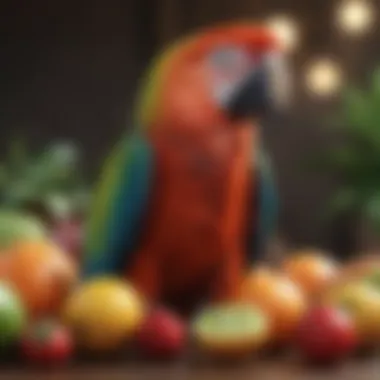
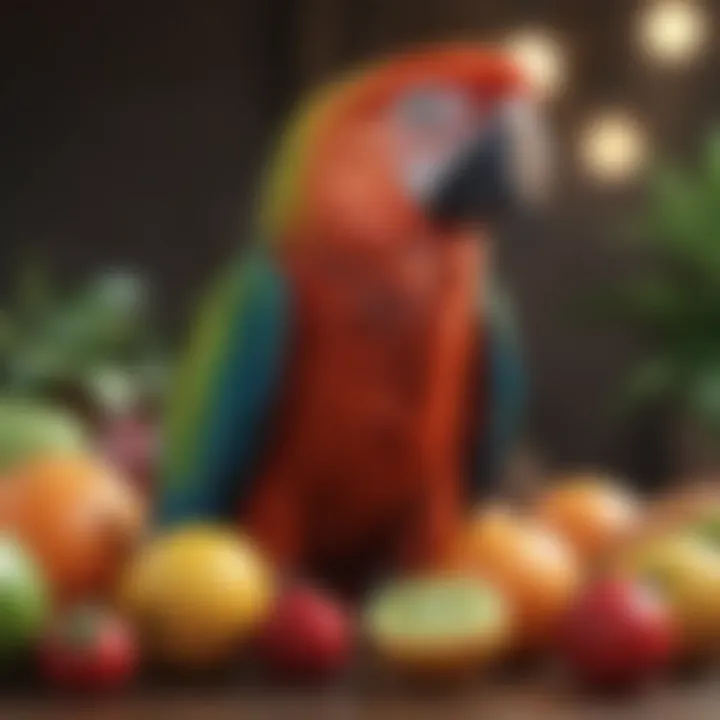
Training is paramount since it not only teaches birds commands but also promotes mental stimulation, helping to stave off boredom. Macaws thrive on interaction, and engaging them in training sessions can be a fulfilling experience for both the bird and its owner. Given their social nature, Macaws need to be mentally challenged to maintain their well-being, echoing the sentiment that a tired bird is a happy bird.
Basic Commands and Tricks
Starting simple, the foundation of Macaw training lies in basic commands. Commands such as "step up" or "come here" might seem basic, but these commands establish a framework for stronger communication. A practical approach is to use positive reinforcement. Whenever your Macaw responds correctly, rewarding them with favorite treats, such as sunflower seeds or a piece of fresh fruit, reinforces the desired behavior.
- Consistency is key. Train at the same time every day. This helps set a routine for your parrot.
- Short sessions work best. Keeping the training periods around 5 to 10 minutes prevents fatigue and boredom.
- Use clear signals. Body language must be straightforward and predictable.
As your Macaw masters the basics, you might consider teaching more complex tricks, like turning in circles or giving high fives. These tricks not only impress guests but also serve as an excellent way to bond with your pet, deepening your relationship through shared activities.
Dealing with Behavioral Issues
No matter how well-trained a Macaw is, behavioral issues can crop up. Understanding and addressing these behaviors is crucial to ensure a smooth coexistence. What might seem like mischief can often stem from unmet needs or natural instincts.
Common behavioral problems include:
- Excessive screaming: Often a sign of boredom or a cry for attention.
- Feather plucking: This can indicate stress, illness, or improper diet.
- Biting: Usually a defense mechanism. Addressing the underlying cause often involves reassessing interaction methods.
To deal with behavioral issues, owners should:
- Identify triggers. Observe when and why the behavior initiates.
- Redirect negative behavior. Instead of simply punishing a Macaw for acting out, redirect their focus to an engaging task.
- Be patient and empathetic. Understand that behavior modification takes time and persistence.
Behavioral issues in Macaws often reflect a need for engagement or indicate underlying stressors that require attention.
Staying observant and proactive not only fosters a good relationship with your Macaw but ensures a happy, healthy environment for your feathery friend. So, whether you're teaching them a new trick or tackling old habits, remember that training is a journey taken together, one that deserves patience, creativity, and an open heart.
Ethical Considerations in Macaw Care
Caring for macaw parrots goes beyond mere feeding and housing; it encompasses a set of ethical responsibilities that every owner should take to heart. Acknowledging these considerations ensures that these intelligent and vibrant creatures receive the kind of care that mirrors their needs in the wild. It’s about balancing personal enjoyment with the welfare of the bird. After all, these magnificent parrots are not just pets; they are beings with social structures, emotional needs, and complex behaviors that require a dedicated understanding.
Conservation Status and Threats
In the wild, macaw species face several threats that jeopardize their survival. Habitat destruction due to deforestation, illegal trapping for the pet trade, and climate change pose significant challenges. The International Union for Conservation of Nature (IUCN) lists various macaw species as threatened. It's essential for potential owners to be aware of these issues.
- Habitat Loss: Forest clearing for agriculture, logging and urbanization reduces the areas where these birds can thrive.
- Illegal Trade: Despite laws protecting them, many macaws are still snatched from their natural environments. This not only impacts wild populations but also leads to the suffering of individuals that are taken from their families.
- Climate Change: With changing weather patterns, food availability in certain regions can dwindle, making survival ever harder.
Before bringing a macaw home, consider sourcing from ethical, reputable breeders or shelters. This decision plays a pivotal role in reducing demand from illegal captures and supports conservation efforts in the long run.
"Every time you buy a parrot, remember, you make a choice between supporting conservation or contributing to its decline."
Adoption vs. Breeding
When contemplating adding a macaw to your family, the choice between adopting a bird or buying one from a breeder is crucial. Each option has its nuances and ethical implications that every potential owner should consider carefully.
- Adoption: There are many parrots in rescues that need loving homes. Opting for adoption not only provides a second chance to a bird in need but also helps alleviate the pressure on populations in the wild. Often, rescued macaws come with their history, which may require special attention or rehabilitation. Yet, one should be fully prepared to understand and manage any behavioral quirks that adopted birds may come with.
- Breeding: Purchasing from a breeder can sometimes be seen as a more straightforward option, as these macaws are often raised in controlled environments. However, it is essential to choose responsible breeders who prioritize the health and welfare of their birds. Responsible breeders refrain from overbreeding, maintain high welfare standards, and ensure that the birds are socialized and healthy before they find their forever homes.
Ultimately, being an informed owner means grasping the responsibilities that come with the choice made. Whatever path you choose, the focal point should always be the macaw's health, happiness, and ability to flourish physically and emotionally.
Understanding Macaw Lifespan
Understanding the lifespan of Macaw parrots is crucial for potential and current owners. These birds can live several decades; many even reaching ages around fifty years when provided with proper care. This longevity is not merely a statistic; it symbolizes the deep commitment required from their guardians. Knowing how to promote their well-being can significantly enhance their quality of life and the emotional bond shared with them.
Macaws are not just companions; they are lifelong partners who thrive on interaction, mental stimulation, and a conducive living environment. Therefore, recognizing the factors that impact their life expectancy is paramount.
Factors Affecting Longevity
Several aspects play into how long a Macaw can live, notably their diet, environment, social interactions, and health care. All these parts interlock like gears in a finely-tuned clock.
- Diet: A balanced diet is fundamental. In the wild, Macaws consume seeds, nuts, fruits, and sometimes even vegetation. For domesticated Macaws, it’s essential to replicate this variety. Lack of nutrients can lead to deficiencies, impacting their health and shortening their lifespan.
- Environment: The living conditions significantly influence longevity. A spacious cage, clean environment, and safe, stimulating surroundings provide comfort and reduce stress. On top of that, they should have opportunities to stretch their wings outside of their cages regularly.
- Social Interaction: Macaws are highly social creatures. Isolation can lead to depression and anxiety, which, in turn, may have detrimental effects on their health. Spending quality time engaging with your Macaw is not just a bonus; it's a necessity.
- Regular Health Checks: Routine veterinary visits can catch potential health issues early on. Macaws are prone to certain diseases, and timely interventions make all the difference in their longevity.
Long-Term Care Responsibilities
Owning a Macaw is more than just a passing hobby; it involves long-term responsibilities that require dedication and attention. The journey starts with understanding their needs at every life stage.
- Commitment: One must be prepared for a lengthy commitment. It's not a decision to be taken lightly, considering some Macaws can outlive their owners. Thoughtful planning is vital.
- Health Maintenance: Owners should familiarize themselves with common health problems like obesity, feather plucking, or respiratory issues. Providing routine care, including proper hygiene and vaccinations, can lead to longer life.
- Environmental Engagement: Creating an enriching atmosphere goes a long way. This can include toys, perches, and safe climbing structures. Macaws thrive on activity; bored Macaws can show behaviors that betray their unease.
- Diet Control: Knowledge about what your Macaw should eat keeps them healthy. Regularly adjusting their diet throughout their lives based on health and age provides essentials for longevity.
- Socialization: Ensuring they are not just fed but engaged is key. Regular playtime, along with opportunities for social interaction with both humans and other birds, helps build a balanced life.
"A Macaw’s happiness is directly tied to its physical and mental well-being, which in turn impacts its lifespan. The better their life, the longer they share it with us."
Closure: The Future of Macaw Care
In light of the complexities surrounding the care of Macaw parrots, it becomes increasingly important to consider how owners can contribute positively to their lives. By emphasizing good practices and an informed approach, we can foster environments where Macaws not only thrive but also enjoy fulfilling lives. As these birds possess both intelligence and emotional depth, their interactions with humans should never be underestimated. Therefore, the future of Macaw care hinges on understanding both the birds' needs and the evolving dynamics between them and their caregivers.
Essentially, adopting best practices is not just about keeping your parrot alive; it’s about elevating their overall quality of life. This proactive and compassionate approach can create a harmonious bond. As we advance in our understanding, the scope of care can evolve to encompass not just physical needs but also psychological welfare.
Best Practices for Owners
- Regular Health Monitoring
Keep an eye on your Macaw’s physical condition. Regular weight checks and behavioral observations are crucial. Any sudden changes in eating, drinking, or activity levels can signal underlying health issues. - Provide a Balanced Diet
Nutritional variety is key. A mix of high-quality seeds, pellets, fresh vegetables, and occasional fruits will ensure your Macaw receives all the necessary nutrients. Avoid relying too heavily on one type of food, as this can lead to deficiencies. - Create a Safe Habitat
Make sure to have a spacious cage that allows freedom of movement. Safety comes first, so avoid any toxic plants or hazardous surroundings in their living area. - Engagement and Stimulation
Macaws are naturally curious birds. Providing interactive toys, climbing structures, and opportunities for socialization will contribute to their happiness. Think of your Macaw’s space as a playground. Rotate toys regularly to keep things fresh and exciting. - Respect Their Social Needs
Macaws are sociable creatures and need companionship. Spend adequate time engaging with them, whether through direct play or conversation. Understanding their social cues can profoundly strengthen your relationship. - Establish a Routine
Birds thrive on routine. Regular feeding times, play periods, and sleep schedules can minimize anxiety and lead to a healthier lifestyle. Consistency encourages trust between you and your Macaw.
A well-cared-for Macaw often reciprocates with affection and social bonding, making care a two-way street.
- Educate Yourself Continuously
Trends in avian care are always evolving. Join forums or groups like those on Reddit or Facebook where experienced bird owners share insights. Keeping abreast of new findings can make all the difference in your Macaw’s well-being. - Think Long-Term
Understand the lifelong commitment required when adopting a Macaw. Make plans for their future care long before the need arises. This foresight ensures that they receive the consistent care and attention they deserve throughout their lifespan.
Adopting these best practices will not only enrich the lives of your Macaws but also deepen the bonds you share. As understanding of avian welfare expands, so too should our approach to caring for these vibrant creatures.















